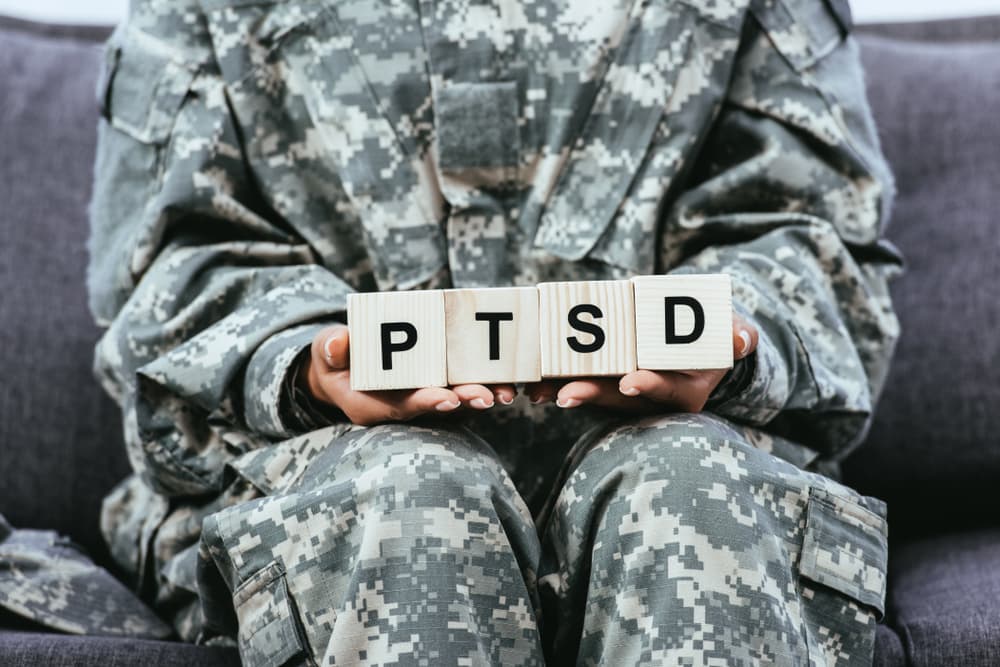
Those who sacrificed their safety and their lives deserve the best care and treatment for military service-related conditions. Unfortunately, their experiences physically and mentally harm many Veterans.
If you know a Veteran who is struggling with trauma-related issues, you probably want to know how you can help.
To learn more about how to help a Veteran with PTSD, let’s take a deeper look at what affects our Veterans and what resources can help them battle this common condition. Together, we can raise awareness for this important disorder and help those we love receive the treatment they need.
Every year, the Veterans Administration (VA) issues a report describing the incidence of Post Traumatic Stress Disorder (PTSD) among our Veterans. In one recent year, among the six million Veterans who received VA services, approximately 10 percent of men and 19 percent of women received PTSD diagnoses.
The National Center for PTSD found that between 11 and 20 percent of Veterans who served in Operation Iraqi Freedom and Operation Enduring Freedom experience PTSD, while 12 percent of Gulf War and Desert Storm Veterans are diagnosed with PTSD in any given year. Tragically, approximately 30 percent of Vietnam Vets have experienced PTSD during their lives.
With so many of our service members facing the challenges of PTSD, we must recognize and understand the potential symptoms and available options.
Veterans who were exposed to terrifying and traumatic events during their tour of duty may experience PTSD symptoms. Certain triggers can cause these issues, and those close to the Veteran can watch for these signals to know when and how to help a Veteran with PTSD.
After experiencing a traumatic event during military service, some Veterans experience PTSD symptoms.
These feelings can fall into four basic categories:
Unfortunately, PTSD symptoms can arise at different times for different people. Some Veterans may show signs of PTSD immediately following a stressful event or shortly afterward.
Others may not exhibit symptoms for months or even years until something triggers a PTSD response. For example, when a Veteran is discharged from service and must assimilate into civilian life, they may show the first signs of PTSD.
The sooner a Veteran receives treatment for PTSD, the better chances they have for recovery.
The National Center for PTSD recommends seeking treatment if:
PTSD treatment may involve one-on-one counseling, group discussions, medication, and other options. Sadly, if a Veteran doesn’t seek help for PTSD, left untreated, this condition can lead to dangerous and self-harming behavior such as excessive drinking, drug abuse, or even criminal acts.
If a Veteran winds up facing criminal charges, they should seek help from a law firm dedicated to helping Veterans sort out their criminal situation.
When you recognize the symptoms of PTSD, or you suspect a Veteran is struggling with this common condition, you can take steps to help. Due to the nature of this disorder, many Veterans are reluctant to seek help on their own. With your support and understanding, you can make a difference in their future.
The Veterans Administration recognizes PTSD as a disability for benefit purposes. However, proving a Veteran is suffering PTSD from a traumatic military service event can be challenging. Although Veterans can apply for benefits online at the VA website or mail in VA Form 21-526 to their local VA Regional Office (VARO) it is not a simple process.
The Veteran will need a PTSD evaluation to apply for benefits. You can help the Veteran contact a local VA Medical Center or make an appointment with their family doctor for a referral to a mental health facility for the assessment. This process usually involves an interview with a psychological professional along with a questionnaire or other form of assessment to determine if the person is experiencing PTSD.
Even if the Veteran is diagnosed with PTSD, the VA will require proof that the condition arose from a service-related incident before it will award disability compensation. This is where a skilled PTSD lawyer can prove invaluable.
A Veteran must be able to prove three conditions to qualify for PTSD benefits through the VA:
In most situations*, a Veteran’s personal statements and memories alone will not support an application for PTSD benefits. An experienced Veteran’s benefits lawyer will understand what evidence you need to bring a successful claim for VA benefits.
[*If the Veteran experienced first-hand combat, the actual threat of hostile activity, or was a prisoner of war, their own statements can serve as sufficient evidence of military-related trauma to support a PTSD benefits application.]
A knowledgeable Veteran’s lawyer could help the Veteran receive an Independent Medical Exam (IME) if the VA won’t schedule a PTSD evaluation. Furthermore, a PTSD lawyer can gather medical records, complete a Residual Functional Capacity Form (RFC), and work with others to prepare buddy statements, lay-person testimony, or even news stories as evidence to verify the traumatic event experienced by the Veteran.
Skilled legal advocates can help the Veteran prepare a solid application to support a request for PTSD benefits. They can also assist if the Veteran already applied and the VA denied their request. Determined VA benefits lawyers know how to successfully appeal the denial of a PTSD request and help Veterans receive the benefits and treatment they deserve.
Veterans facing PTSD complications deserve all the help and benefits we can provide. The process of applying for and receiving benefits is so complicated that sometimes, even the VA makes mistakes.
The best way to help a Veteran with PTSD is to work with an experienced VA disability and PTSD lawyer who knows how to provide the evidence needed to qualify for PTSD benefits. At Berry Law, we are Veterans fighting for Veterans, and we know what it takes to protect our honored service members.
Call our team at (888) 883-2483 or fill out our simple online contact form to learn more about how we can help. Together, we can support our nation’s Veterans dealing with PTSD.

Our monthly newsletter features about important and up-to-date veterans' law news, keeping you informed about the changes that matter.